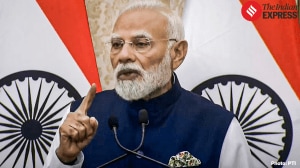Can we have some arrogance now?
We hear the word vikas a lot since the assembly elections. Development. It’s all about vikas political pundits have taken to saying ev...

We hear the word vikas a lot since the assembly elections. Development. It’s all about vikas political pundits have taken to saying ever since their predictions for Rajasthan, Madhya Pradesh and Chhattisgarh were proven embarrassingly wrong. If you are forced to read as many newspapers a day as I am you read ad nauseam these days about how the Indian voter has finally ‘come of age’ and is voting for the right things. Development. Instead of temples and hysterical religiosity.
As someone who has been covering elections since Indira Gandhi famously lost in 1977 can I say that I have been reading about the ‘wisdom’ and the ‘coming of age’ of the Indian voter since that momentous election, just as I have been reading about the importance of what, in this election, came to be known by the confusing acronym, BSP. Not Bahujan Samaj Party but bijli, sadak, pani. Electricity, roads, water. It has been the meaning of vikas ever since I can remember elections and the reason why it remains perennially relevant is because once the new chief minister is ensconced with his new government he falls quickly into the toils of supposedly learned, experienced bureaucrats who tell him that there is only one way to govern. The way that we have been governed since British times and that the only reason why nothing by way of vikas ever happens is because there is no money. If we had enough money, Sir, we could change the face of the state.
Since this round of elections has thrown up three women chief ministers let us pray they have the courage to be different. The courage to say: rubbish. The courage to throw every learned, experienced bureaucrat out of their office and seriously examine why the most basic needs of 21st century life are seemingly so hard to provide only in India. They could find that there is plenty of money, the problem is that it gets spent on the wrong things. So, every learned experienced bureaucrat will, for instance, have twenty more clerks, peons, secretaries and sundry other underlings than he needs. As it is impossible to sack government servants what is required is redeployment. Why should said underlings not be sent off to rural parts to work where they are really needed?
They could begin by producing reports on why bijli and pani are so difficult to provide. Is it because the projects to produce and deliver them continue to be on the massive, unwieldy scale we became accustomed to in socialist times? What alternative methods are available? Rajasthan’s countryside is currently awash with NGOs trying to revive the old water systems that were allowed to collapse because villagers were promised water at the turn of a tap and irrigation all year round. What can the new government do to help the NGOs work faster? What can government do to provide regular supplies of electricity to desperate farmers who remember clearly a time (under Bhairon Singh Sheikhawat) when they could rely on seventeen hours of electricity a day. Under Ashok Gehlot, mysteriously described not long ago as the best chief minister in India, supplies were reduced to three or four irregular hours. The only thing connected with electricity that villagers could rely on was the prompt and regular arrival of the bill.
This is an improvement on farmers being guaranteed free electricity for short-sighted, populist reasons but what needs to be understood is that people would be happy to pay if they could be sure of regular supplies. Why should they pay for bad services? Why should they pay for the incompetence of bankrupt state electricity boards?
If the new chief ministers are prepared to be innovative they could use their vast, mostly idle manpower to do many other things. It could be deployed, for instance, to find out why rural schools work so badly? What can be done to improve standards? And, why schoolteachers, now very well paid, are routinely sent off to do other jobs like help gather census data and update electoral rolls. What of the grandiose sounding Sarva Shiksha Abhiyan, is it not merely a massive literacy program designed more to give Murli Manohar Joshi statistical joy than children education? Do we even dare use the word shiksha?
Why is healthcare in such a mess that the vast mass of our rural population is forced to rely on the dodgy services of private medical practitioners? If serious efforts were made to understand the flaws in the system what is likely to be revealed is that resources have been wasted on setting up huge hospitals and health centres that do not function because they have neither doctors nor medicines.
Anti-poverty programs also desperately need a new approach. Instead of spending vast amounts of money on cumbersome schemes that deliver nothing in the end why should the money not be put directly into the hands of voters, especially women, through micro-credit? Does all this sound too simplistic? If it were that easy, you will say, then why has no chief minister done all this before? The answer, as I see it, is because those learned, experienced bureaucrats are much better at reducing chief ministers to groveling dependence than you or I can dream of. They are also masters of setting up sophisticated obstacle courses. I have seen intelligent, popular chief ministers stymied at every step if they try to disobey the bureaucracy. The tragedy is that unless the new chief ministers are prepared to be totally disobedient we will still be talking about bijli, sadak, pani five years from now and, who knows, fifty years from now.
Write to tavleensingh@expressindia.com



- 01
- 02
- 03
- 04
- 05




























